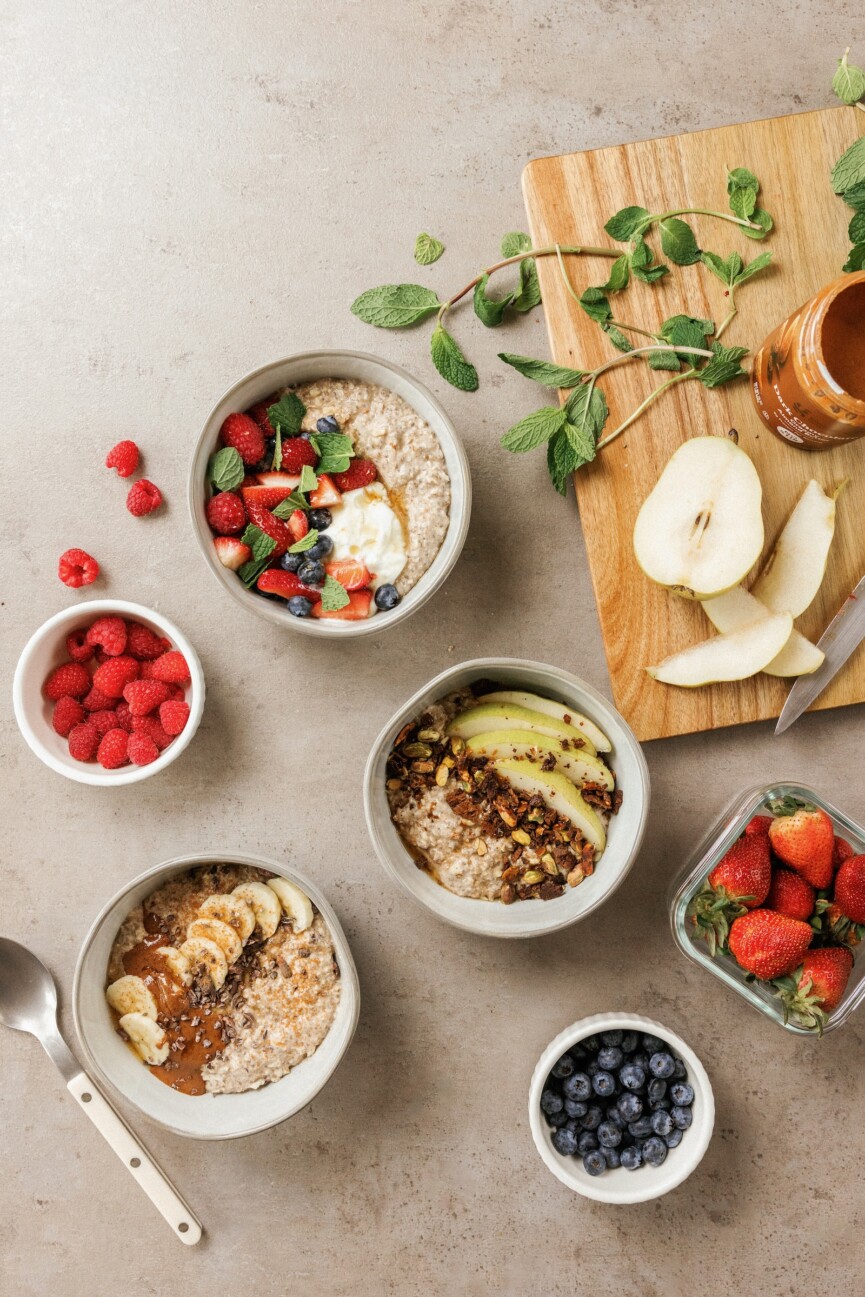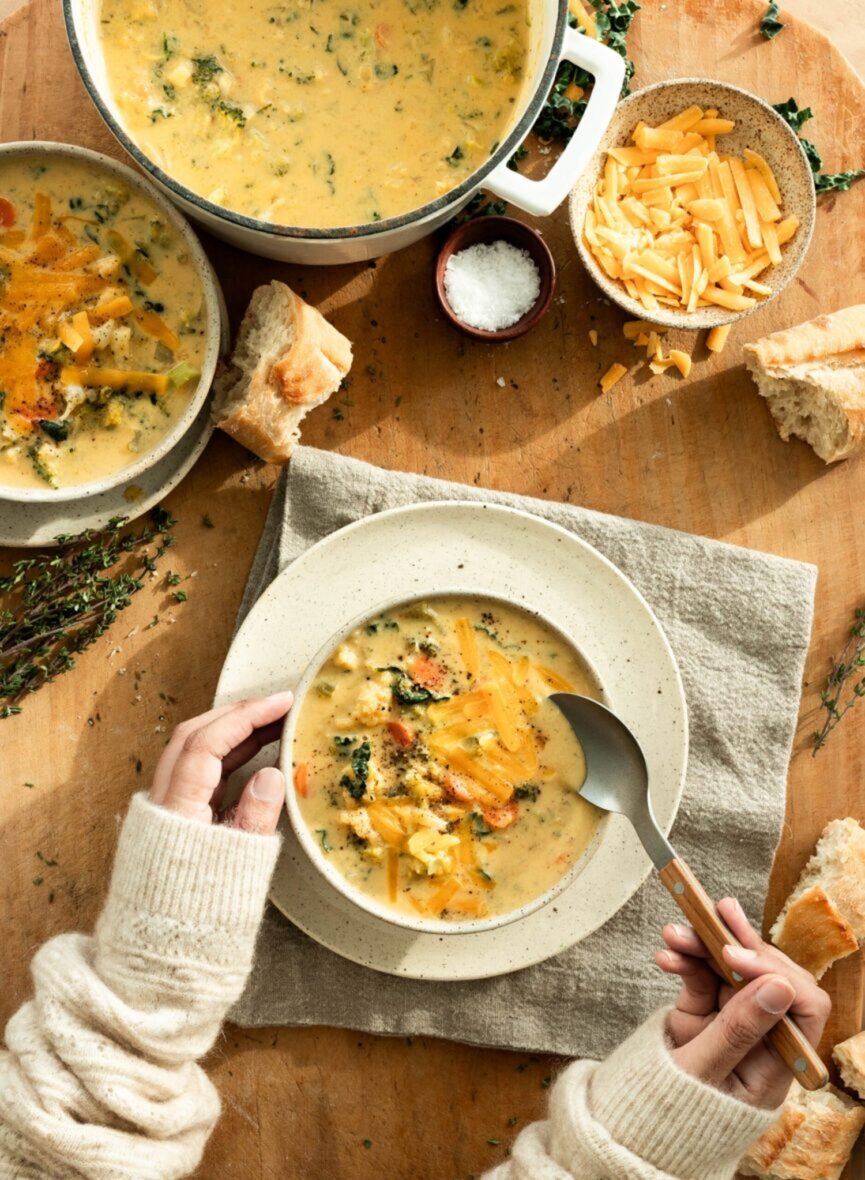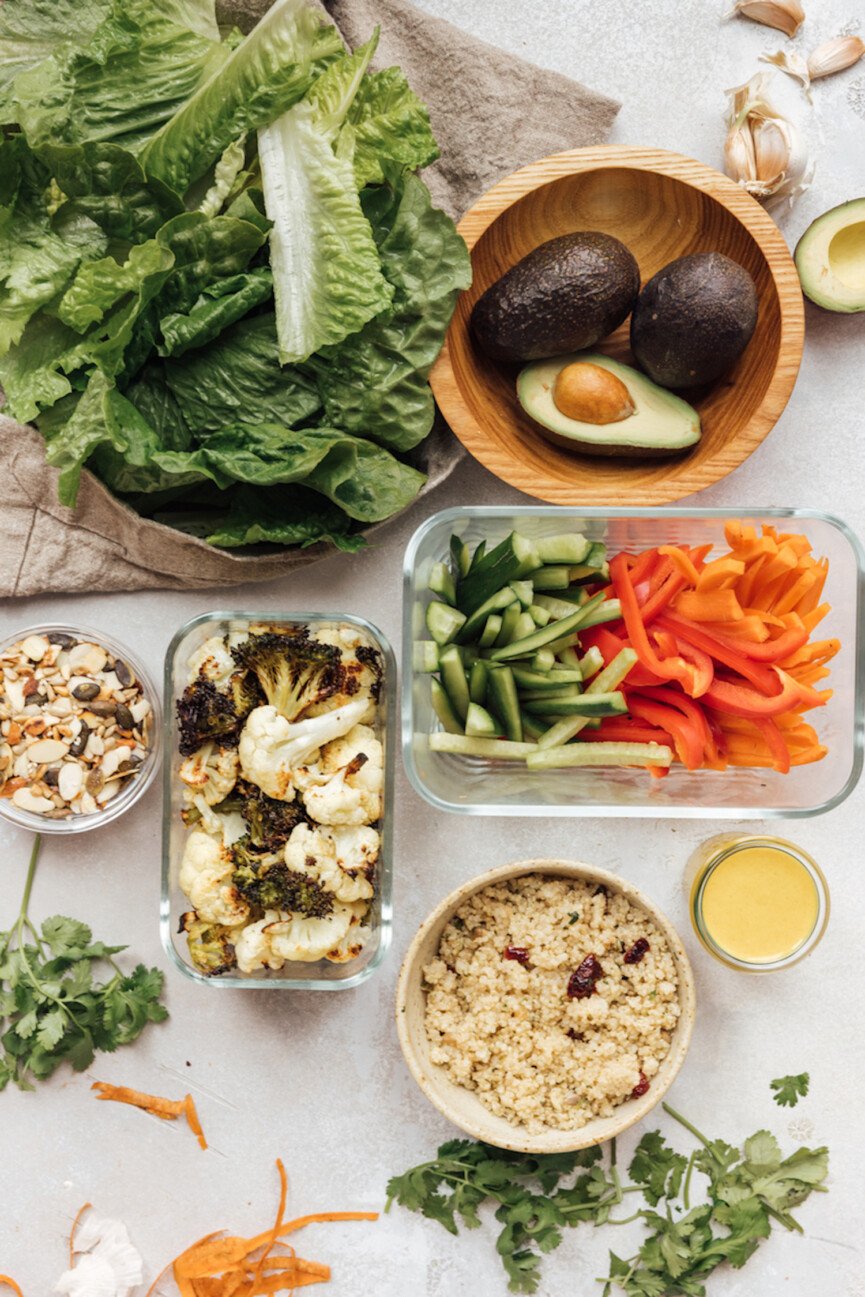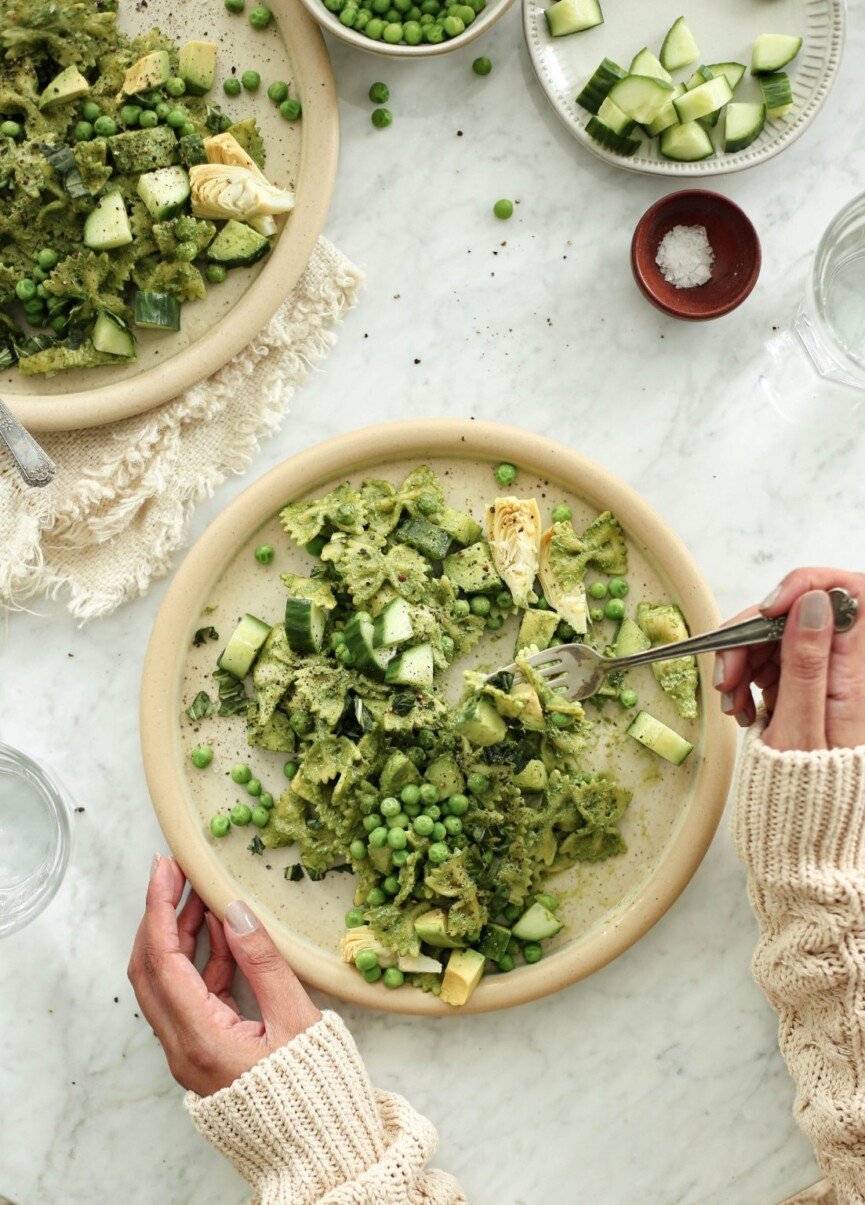Sleepless nights. Constant feedings. A whirlwind of unpredictable emotions. As a soon-to-be mom, you’re likely feeling it all. Anticipating the fourth trimester (both its sanctuary and sacrifice) is daunting. Rest assured, you’re in good company. I’m a mom of two—who recently emerged from the newborn haze. Speaking from personal experience, the last thing to fret over is cooking nourishing food. Enter this postpartum meal prep guide. These meals will be your lifeline, providing quick and nutritious options when you need them the most. They’ll help make the transition to motherhood a bit smoother, but the clock’s ticking. Before your bundle arrives, set yourself up for success.
Ultimately, now’s the time to lean on your village. And spoiler alert: your family, friends, and community want to help you. You’ll be so grateful you reached out! In turn, you can focus on what truly matters: bonding with your baby and taking care of yourself. This resource covers it all, including postpartum nutrients, how to organize a meal train, and a roundup of meal-preppable recipes.
image above by Michelle Nash for our interview with Camilla Marcus
Why Postpartum Meal Prep Matters
After your baby is born, having nutritious, ready-to-eat meals at your fingertips makes a world of a difference. They’ll provide nourishment and energy, save your sanity, and ease the burden of unnecessary house chores. Envision warming up a bowl of hearty soup or digging into a wholesome slice of lasagna. Sound comforting? Ultimately, having meal prepped dishes will provide a sense of stability. (Just what the doctor ordered.)

What to Know About Postpartum Nutrition
As you start brainstorming postpartum meals, don’t underestimate the importance of nutrition. Certain nutrients play a critical (and game-changing!) role in healing and recovery, energy levels, breastmilk production, and emotional well-being.
Of course, adequate calories are also necessary to fuel the demands of motherhood. This means the requirements for all macronutrients—and the large majority of micronutrients—increase during postpartum. You’ll need starchy carbs for slow-digesting energy, protein for satiation and rebuilding tissue, and healthy fats for blood sugar stability. Last but not least, don’t forget digestion. Cooked veggies and probiotic-rich foods are key for a thriving postpartum gut.
And if you plan on breastfeeding, you’ll need 350-500+ additional calories per day!

What to Eat After Your Baby Arrives
Think: hydrating, easy-to-digest, nutrient-dense meals like soup with rice, a sweet potato with soft-boiled eggs, or steel-cut oats with almond butter and stewed berries. All of the organs in your abdomen are going through a massive shift, and digestion is likely to be compromised. Stock your fridge and pantry with the following ingredients:
- Eggs. Packed with choline (to support your mental health and baby’s brain development), pastured eggs are one of the most nutritious and convenient ingredients to have on hand. For plant-forward mamas, opt for non-GMO soy/tofu for a source of choline.
- Greens. Asparagus, spinach, kale, and arugula are a versatile source of folate, which supports the production of new cells, aids in tissue repair, and helps prevent anemia.
- Avocado. As a postpartum mom, avocados help you—and your baby—absorb fat-soluble vitamins and can benefit your baby’s developing brain. For a quick and satisfying snack, sprinkle half an avocado with nutritional yeast and flake salt. Drizzle with balsamic glaze. Eat with a spoon or seedy crackers.
- Berries. Keep bags of organic berries in your freezer to top your granola, oatmeal, or add to smoothies. Their fiber and antioxidants are important for postpartum mamas.
- Legumes. Another source of folate, legumes are a nutritious addition to bowls and salads. Keep canned lentils, chickpeas, and black beans in the pantry to bulk up your lunches and dinners.
- Bone broth. Rich in minerals and collagen, this superfood aligns with the traditional practice of serving new mothers warm beverages (and soups) to heal her body.
- Fermented ingredients. Kimchi, miso, kefir, sauerkraut, and yogurt aid in digestion, nourish breast milk, and help rebuild the microbiome.
- Nut butter. Monounsaturated fats, the majority of fat found in nuts, help combat emotional fluctuations by steadying blood sugar. Snack on a handful of walnuts or add nut butter to toast, smoothies, and oatmeal.
- Seeds. Chia, flax, and hemp seeds are easy (and nutrient-dense) additions to smoothies, oatmeal, and avocado toast. They’re rich in omega-3 fatty acids for hormone balance and brain health.
- Coconut. Another healthy fat to incorporate, it’s known to nourish breast milk.
- Sardines. These are packed with a variety of nutrients that new mothers need—DHA, calcium, and vitamin D3. They’re also one of the richest sources of choline! Available tinned, keep them in your pantry for an easy addition to savory meals.
- Root veggies. These comfort foods (beets, acorn squash, butternut squash, etc.) are easy to roast and pair well with any protein. Plus, they keep well in the fridge. Pair them with a healthy fat to help keep blood sugar stable—like tahini or avocado—and increase the absorption of nutrients like beta-carotene.
- Grass-fed liver. Liver is rich in vitamin A, which helps replete blood loss after birth. If eating liver makes you squeamish, you can opt for a grass-fed liver supplement (or add liver to your food processor along with ground beef to make these meatballs!).
- Greek yogurt. If you tolerate lactose, organic/pasture-raised Greek yogurt is a convenient source of protein and probiotics. Cottage cheese is another dairy source worth stocking up on!

Benefits of Meal Prepping Before Your Baby Arrives
You’ll be so relieved you carved out the time! This is why:
Better Planning
Newborn care. Newborns require a lot of attention, and while their needs are simple, they’re often unpredictable. Having meals prepped means you spend less time cooking and more time attending to your baby.
Sleep deprivation. Prepped food eases the burden of having to cook when you’re exhausted.
Optimal Nutrition
Balanced diet. Prepping meals in advance is the best way to maintain a balanced diet, which is crucial for recovery post-delivery and—if breastfeeding—for milk production.
Healthy choices. Rather than reach for ultra-processed foods when you’re hangry, you’ll have healthier choices to nosh on (for better satiation and stable energy).
Stress Reduction
Ease and convenience. This goes without saying, but knowing your meals are taken care of reduces daily stress.
Lessens decision fatigue. With meals/snacks already prepped, you eliminate the need to make extra decisions.
Economic Benefits
Cost savings. If you have the fridge/freezer space, preparing meals in bulk is more economical than buying one-off ingredients or ordering frequent takeout.
Waste reduction. Preplanned meals help in minimizing food waste as you buy and use exactly what you need.
Flexibility
Adaptability. Prepped meals—particularly those that are pre-portioned— provide flexibility at meal times and reduce the pressure to cook fresh meals daily.
Quick meals. Having ready-to-eat/easy-to-prepare meals are lifesavers during unexpected busy or challenging days.

The Best Types of Postpartum Foods to Freeze
Based on your food preferences and dietary preferences, consider the following foods to make ahead and freeze!
Soups and stews
Casseroles
Curries and chili
- Lentil curry. Full of spices and plant protein, this coconut curry is delicious with rice or naan.
- Vegetarian chili. Beans and veggies provide fiber and protein in this vegetarian chili. (It’s a house fave!)
Baked goods
Grain Bowls
Quinoa or rice bowls. Follow this guide for making your own SweetGreen at home.
Pasta dishes
Comfort food. This vegan mac and cheese is the definition of cozy cuisine.
Smoothie packs
Pre-portioned smoothie ingredients. Freeze bags with fruits, veggies, and nuts/seeds for quick, nutritious smoothies.

Tips for Freezing Your Postpartum Meals
Now that you have your meals made and prepped, here are a few tips you can follow to ensure they keep well and are ready in a pinch. Work smarter, not harder.
- Label and date each container before freezing. Ideally, with the name of the dish and the date it was frozen, as most need to be consumed within three months of freezing.
- Pack properly. Use airtight containers or freezer bags to prevent freezer burn.
- Make reheating a breeze. Freezing meals in individual or family-sized portions ensures you have exactly as much as you need, whenever you need it.
- Include instructions. Write out how to reheat each meal on a label attached to each container.

What is a meal train?
A meal train is an organized initiative that brings your village together. Family, friends, colleagues, and members of your community band together to support you with meals during a joyous life event (a new baby!) or an extremely challenging loss. This thoughtful gesture is two-fold: it provides much-needed nutritional support and delivers a powerful message of love and support.
Ultimately, a meal train shows how small acts of kindness can make a significant impact during life’s most profound—and transitional—moments. As a postpartum mama, a meal train is worth gold.
How to Set Up a Meal Train
It’s easy! First, decide what process you want to use to communicate to your village. This is also how you’ll compile signups. A basic Google Sheet does the job, or you can use a platform like Meal Train or Take Them A Meal. These are helpful for providing a schedule and avoiding duplicates.
Ask one person to be the “leader”—they’ll make sure your meal train runs smoothly. Next, share the meal train link via email (or social media). In your message, thank your community for their generosity and support. Emphasize how their nourishing meals will help you focus on rest, recovery, and your newborn. Gently encourage your friends and family to participate! Last but not least (and this goes without saying), make your meal/snack preferences very clear. That way, you aren’t receiving food you don’t want.
Meal Train Tips
Beyond listing specific postpartum meal prep meals, make sure to include things like:
- Preferred recipes (link to your favorite dishes)
- Allergies, intolerances, or dietary preferences (i.e., No dairy, please!)
- Ideal drop-off windows and where to leave the food (i.e., Leave on the front porch, but text before you come—hopefully it’s a good time for you to meet our newest bundle!)
- Restaurants you love and what you typically order (for those who feel more comfortable getting you takeout)
- Your leader’s contact info

6 Postpartum Meal Prep Ideas
To bring this full circle: as a soon-to-be mama, don’t underestimate the energy and strength you’ll need during the early postpartum weeks! Ideally, extended family and friends will bring you food, but you can also prepare healthy, pre-cooked freezer meals and snacks before your little one arrives. These are some of our faves.
1. Zuppa Toscana
This soup is hearty, satisfying, and packed with anti-inflammatory ingredients. Make a batch of this nourishing recipe for (multiple) healing lunches or dinners.
Other soups we love: Chicken and Rice and Vegan Butternut Squash.
2. Banana Nut Muffins
Keep these in your freezer and pop one or two into the microwave for a wholesome yet decadent boost of energy. Pair a muffin with a cup of Greek yogurt for a satisfying breastfeeding snack.
Other baked goods we love: Healthy Oatmeal Cookies.
3. Slow Cooker Chicken Tikka Masala
You heard it here first: outsource this healthy chicken tikka masala recipe to a friend, and voilà, you’ll think twice about ordering takeout. Keep a bag of microwavable rice in the freezer—or better yet, naan!—and dinner is served.
Other Indian-inspired recipes we love: Butter Cauliflower and Saag Paneer.
4. Vegan Meatballs
Prep these meatballs in advance, pop them in the freezer, and eat them reheated on a bed of pasta, quinoa, or couscous. With cannelini beans as the base, you’re getting a substantial amount of fiber and protein in these flavorful, versatile meatballs.
Other patties we love: Sweet Potato Falafel Burgers and Chicken Burger Lettuce Wraps.
5. Immunity-Boosting Vegetable Soup
This soup packs a major nutritional punch. Plus, it’s a convenient way to pack an inordinate amount of green veggies into one very wholesome meal. Have it with a slice of toasted sourdough (or a simple grilled cheese) for a plant-forward lunch.
Other veggie meals we love: Vegetarian Chili.
6. Grain-Free Granola
You’ll want to eat this grain-free granola by the handful. For added staying power, enjoy over a bowl of yogurt and top your granola with berries for fiber and antioxidants. It’s a quick breakfast—or hearty snack—when breastfeeding hunger strikes.
Another granola we love: Honey Nut and Cinnamon Granola.

